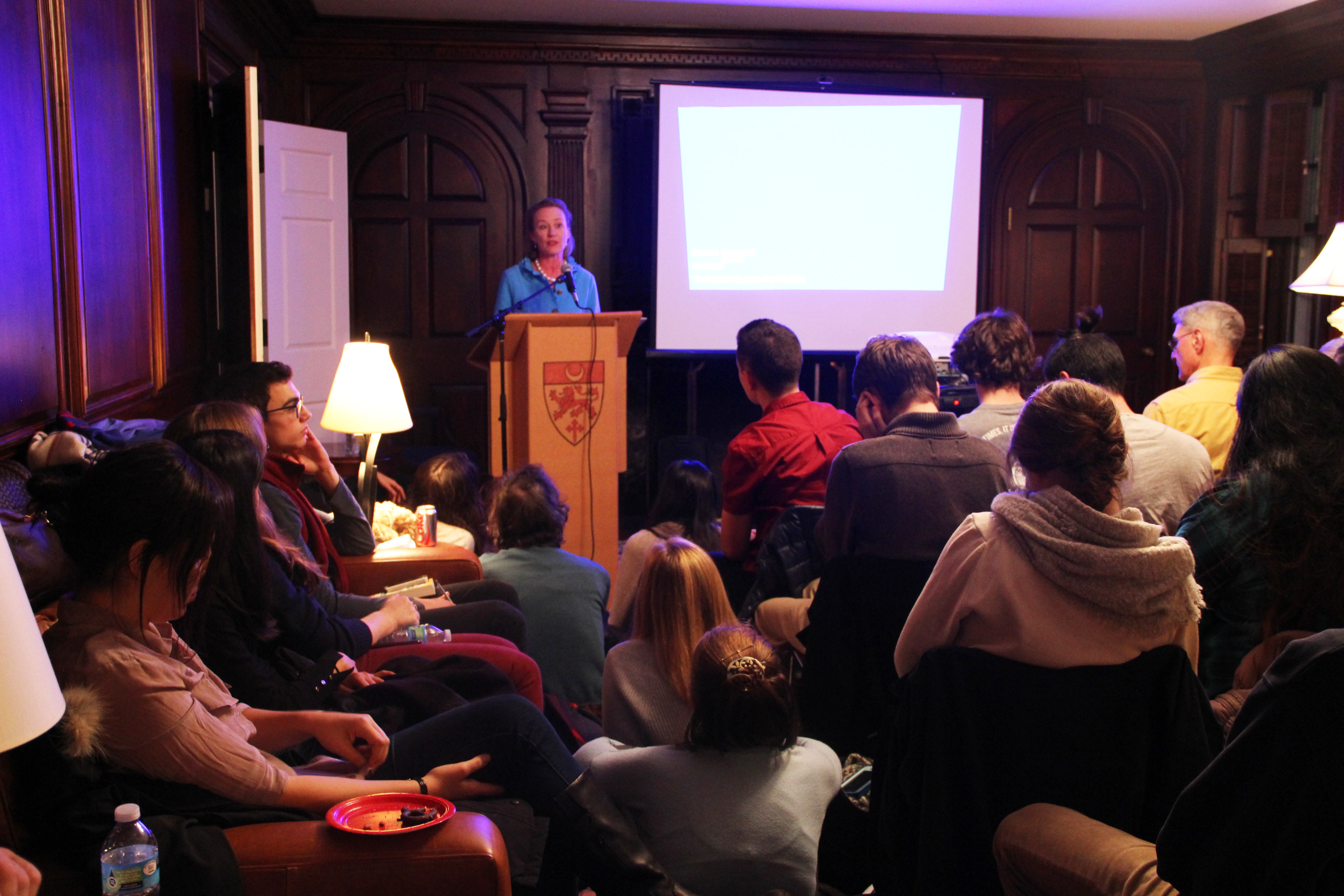
Speaking to a packed room of over 100 students and other members of the Yale community, U.S. Ambassador to Jordan Alice Wells addressed the threat of the Islamic State and Jordan’s role in defeating it.
The tea, which took place Tuesday afternoon in the Timothy Dwight master’s house, focused on the effect the Islamic State, also known as ISIL and Daesh, has had on Jordan and other countries in the Middle East. Before becoming ambassador to Jordan, Wells served under former Secretary of State Hillary Clinton LAW ’73 as well as President Barack Obama. She has also worked as an ambassador in Moscow and in government departments dealing with Egypt, North Africa, Russia and Central Asia.
“I’m going to spend the rest of my professional life grappling with ISIL,” Wells said, adding that the situation will affect everyone in the students’ generation as well.
According to Wells, ISIL intends to create a caliphate — a form of Islamic government that claims authority over Muslims worldwide — that reaches from North Africa to South Asia. The group already controls a region roughly the size of the area between New Haven and Washington D.C., Wells said. It differs from other terrorist organizations in that it has its own military, currency and courts, but like others, it governs with an emphasis on violence.
ISIL’s attempts to instill fear in civilians extend throughout the Middle East as well as the rest of the world, she continued, noting that the most prominent recent example of its violence — the attack on Paris last month — just scratches the surface of the terror ISIL has been spreading. ISIL affiliates seize territory, kill Muslims and promote violence through manipulative propaganda, she said.
“The threat of Daesh is not limited by geography,” Wells said.
In fact, many of ISIL’s supporters have been reached worldwide through social media. Wells estimated that ISIL has taken control of 50,000 to 90,000 Twitter accounts to promote itself and has about 230,000 mentions online every day. But many Western supporters of ISIL who join through these technological platforms have no idea what they are getting themselves into, Wells said.
Nevertheless, Wells said she has hope in Jordan’s ability to fight back against ISIL. She called the country an “invaluable ally” to the United States against ISIL, as Jordanian citizens show support for Christianity and other religions, as well as all eight schools of Islam. They also push back against violence against minorities and have welcomed Syrian refugees with open arms.
According to Wells, ISIL has threatened to invade Jordan and attack the king, but neither the king nor the Jordan citizens have shown fear. Jordanian citizens’ tolerance of others and unwillingness to succumb to ISIL make Jordan a model for other countries, she said.
“Jordan’s vision and promise is the greatest threat to Daesh,” Wells said. “We have got to invest in these ‘islands of decency.’”
However, she said, the influx of refugees to Jordan has begun to overwhelm the country’s infrastructure, which is only one of the challenges currently facing Jordan. Economic troubles include loss of tourism and trade with Iraq, as well as youth unemployment as high as 35 percent, Wells said. School textbooks often promote discrimination of the “other” and unauthorized mosques are known to promote violence. These difficulties can contribute to a lack of hope and subsequent support of ISIL, Wells explained. The only hope that Jordanians have is to remain true to their values.
Wells explained that the war against ISIL is political and ideological as well as military. Because this is not a “conventional battle,” Wells said overcoming ISIL will require extensive negotiations between Middle Eastern countries. Progress in defeating the group will take months and years.
The United States government is deeply invested in Jordan’s success, Wells said, and added that even students can get involved by voting for congressmen who favor international support and having awareness about the issue.
Students interviewed said they appreciated Wells’ eloquence and vast knowledge on the situation in the Middle East.
Nolan Crawford ’19 said that hearing the firsthand perspective from Jordan influenced what he knew about the conflict with ISIL, as all his previous information had come from classes taken at Yale.
Zoe Rubin ’16 said she was struck by Wells’ emphasis on morality as a winning force.
“[The people of Jordan] need to win this battle of ideas by demonstrating their moral values,” she said.
During the question and answer session with Wells, several students also mentioned misunderstandings about Islam due to ignorance as a hindrance in the fight against ISIL, and Wells agreed that the issue has been misinterpreted as a problem with Islam.
“This is not about Islam,” Wells responded. “It’s about terrorism.”
So far in 2015, at least 56 people in the U.S. have been charged for ISIL related activities.







